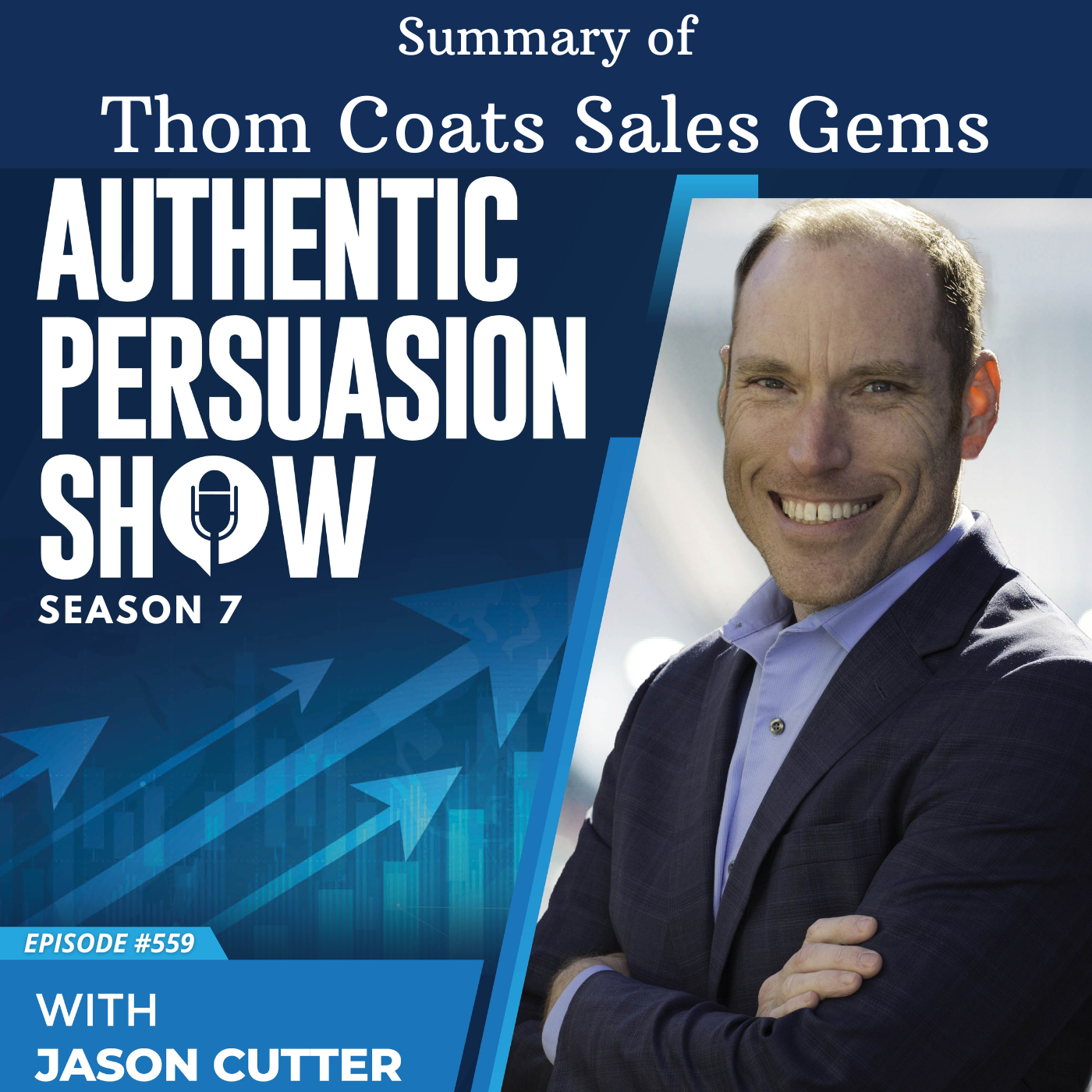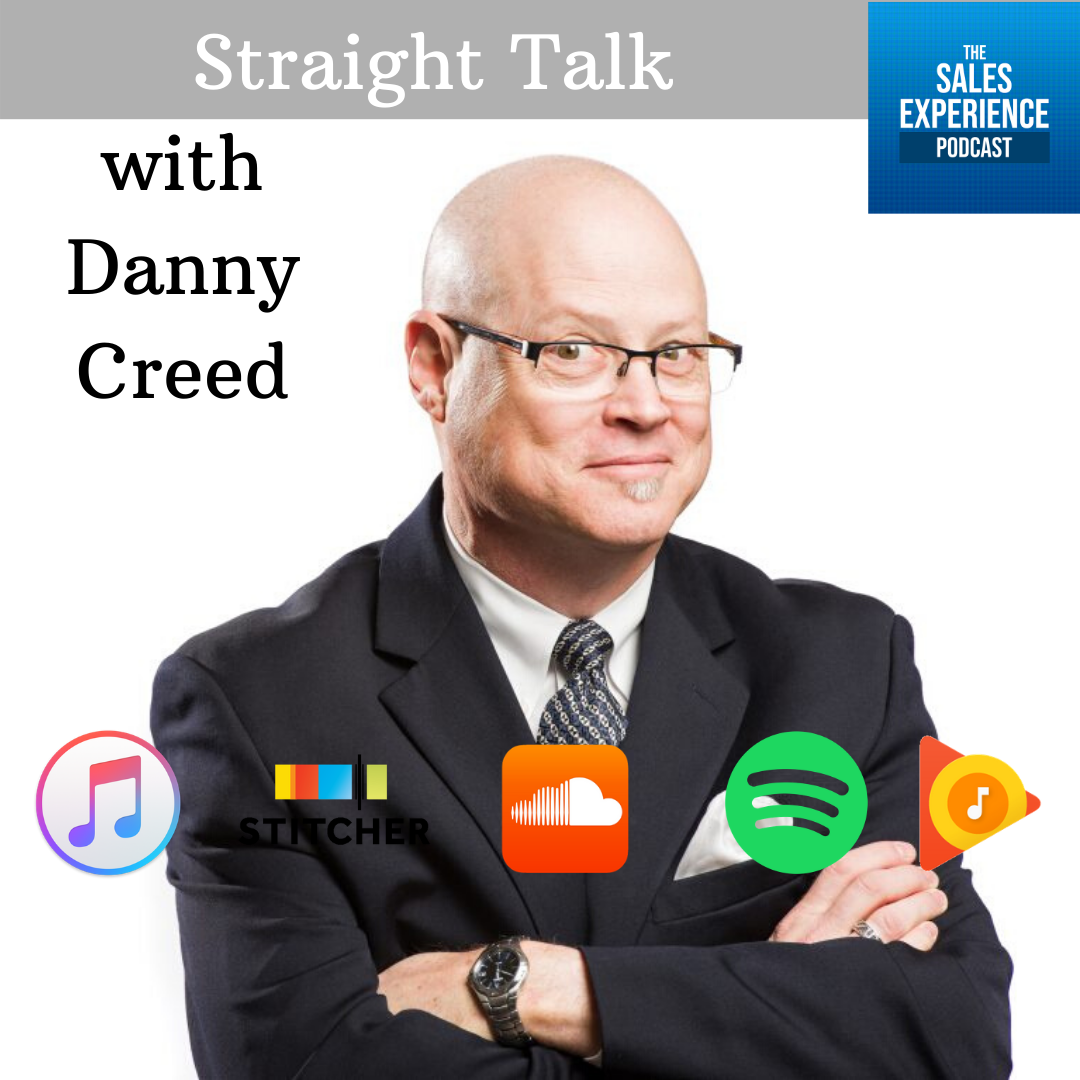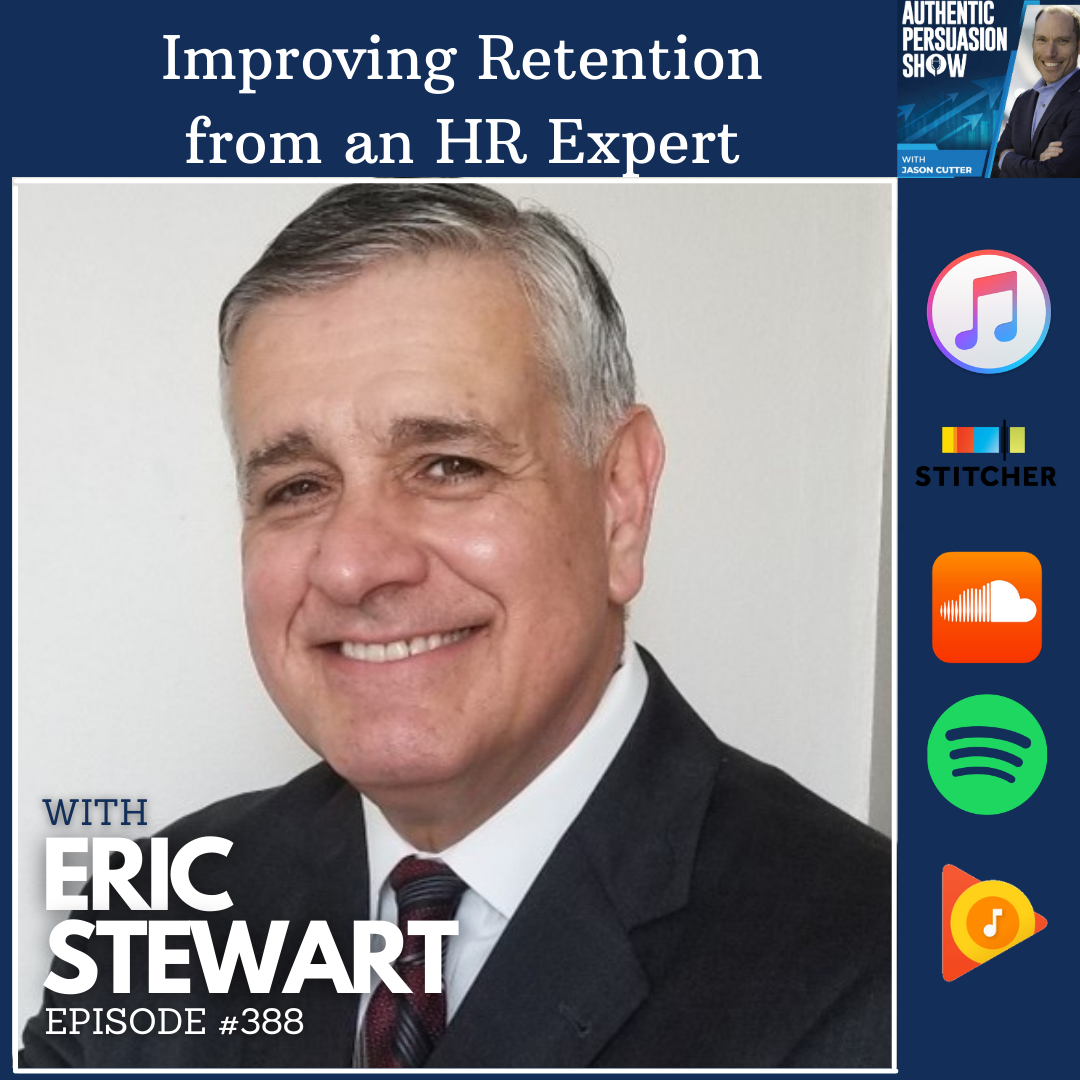Show Notes
This is part three of the conversation I had with Mary.
In Part 3, Mary and I talk about:
- Self-awareness and training effectiveness
- Online, On Demand, Computer Based, Instructor Led, Live Training – which is best
- EQ in Sales Management
- What a great sales experience looks like
Download The Power of Authentic Persuasion ebook
Enroll in the Authentic Persuasion Online Course
Connect with Jason on LinkedIn
Connect with Mary on LinkedIn
Mary’s Info:
Mary Lombardo, Founder of Absolute Impact Corporation, a sales development firm that helps start-up and midsize companies increase profits through custom-designed sales solutions. Connect with her on LinkedIn and Twitter.
Mary has served in Executive Level Leadership and Management roles her entire career, generating revenues from $14 -$60 million dollars that led her to win the coveted title “Salesperson of the Year” both in 2008 and 2009 and joining the Million Dollar Club in 2007. Mary spearheaded and landed a colossal level win while in her role as the Senior Strategic Partnership Leader for Evans Newton, Inc. included a $5M sale for districtwide whole school reform programs that produced double-digit corporate profits.
Her clients have included:
• CEOs of F1000 companies
• CEOs of national education institution
• VPs of HR at national retail chain stores
• VPs of HR at national aerospace engineering company
• VPs of HR at a national real estate agency
• VP of HR at a national retirement facility
• Owners of Statewide Food Distribution companies
• District Superintendents nationwide
With 23 years of sales experience, Mary has a broad and deep scope of all aspects of the pipeline—from lead to close. She began her career as a field sales rep carrying a quota, climbed her way up the corporate ladder to VP of Sales for two f1000 companies. At the time Mary left the corporate world to launch Absolute Impact Corporation, she was managing nationwide sales teams, and sales Directors and still carried a quota!
In addition, Mary studied ballet for 10 years, is a wish granter for the Make-A-Wish Illinois Chapter, a volunteer at Lutheran General Hospital, a Court Appointed Special Advocate (CASA) working with the Cook County Juvenile Court, a lover of theater, and a proud mother of two children.
E124 – Transcript
Jason: Welcome back once again, sales experience podcast. My name again is Jason Cutter. So glad you’re here. You are about to listen to part three of my conversation with Mary Lombardo. Now we had a great time in talking about hiring, training, the sales process and here you’ll cure has continued that conversation both for managers, owners and sales reps. Her specific focus is companies who are selling enterprise-level, big-ticket, long sales cycle, solutions to organizations and so if that’s you, if you’re any part of that process from the top of the org chart on down, then this is the episode for you. If not, there is some value in you for anybody in sales, anyone leading and managing and running a training program. And so this is part three of the conversation. If you missed it, make sure to check out the previous two episodes, part one and part two and again go to cutterconsultinggroup.com/podcast where you’ll find the show notes for this, which will include the full transcript as well as all of Mary’s links, which of course she’s going to cover at the very end of the final part of this series.
Mary: Actually we would first start out with like just a self assessment to bring self-awareness of what type of salesperson, is there a different types of personas that are associated with each of us as salespeople and that just kind of brings some self-awareness. So they would leave after two days with action items from the training, homework that they would need to complete, and that would just start the course of this cohort and we will continue on the process of, you know, a year-long sales training curriculum.
Jason: Got it. And I think that’s really important, especially for any managers, owners, trainers out there, is to keep that in mind for the amount that somebody can absorb in a given day. Even if you take lots of breaks, just like how much content and then I completely agree with you. I think there’s some stuff you can do online, videos, audio lessons you can do with online learning, which for some things, some topics in life you can learn it that way you can go through it, but there also has to be interaction and hands-on and there’s going to be questions. I know in the past the trainings that I have built usually have been some combination where maybe there’s a lesson that’s on a video and then discussion afterwards and then some kind of quiz and tasks to make sure that, you know, some of it’s getting absorbed enough of it’s getting absorbed and some combination. And the value I’ve found with the videos.
Jason: But again, not going a 100% video online learning, is that with the videos, you know it’s going to be standardized. So you know that in case your trainer’s out sick or you have a new trainer, you know the content will be the same every single time and then the discussion afterwards is going to be more organic relative to the topic.
Mary: Yes and I agree with you. There is a place for online learning. I just don’t think it’s for the brand new hires and because it’s also, you know, a rapport building thing and a culture thing for a new company. And so okay these are our HR people and now you’ve done that. These are our product development people and now you’ve done that and now here, let’s talk about how you’re going to go sell to our customers and what we want you. These are our philosophies and our key performance indicators and this is how we go to market, but there is a place for online learning. I just don’t think it’s the initial training because then you know, it creates a culture of nonrelationship or, that’s what I think.
Jason: Yeah. Well and especially with what you’re talking about with consultative sales that are relationship-based relationship focus for the long-term, right. Where, again, we’re whoever’s listening to this, depending on if it’s a shorter sales cycle or a longer one, you could do a consultative sale that’s also, you know, a one-call close or you know a couple of days sales cycle to 1218 month giant enterprise, you know, multimillion-dollar package. But if you’re going to have that kind of sale and that kind of interaction and that kind of selling system, then your training should also match that. So if your sale is a consultative relationship style and your training should be that as well, instead of sitting people down in front of some terminals or computers or having them do it on their own and literally watch some videos, that’s going to be more transactional. You’re basically raising them to be transactional instead of relational that way. Let’s talk real quick about from the sales rep side, because mostly we’ve been talking about building it from a training manager. For any of the sales reps who are listening to this, what do you see as their main responsibility during training? What do you see in trainees who are very successful that go on to do good things with their sales career? Like what attributes, what habits, what do you see from them in the training period.
Mary: In general? Being willing to take a look at their own reactions in the world because as salespeople transact consultative salespeople, how we show up in the world is I believe what’s going to come back in terms of relationship. So no, having some emotional intelligence, knowing why they’re doing it, being open and honest and curious and willing to step out of their comfort zone. You know, they’re going to get rejected a lot more than they’re going to not get rejected. And so I think those are just some very general attributes. Emotional intelligence is a big one. You know, if somebody is telling nine times out of 10 that the answer is no, we don’t want you, we don’t like you. We don’t like your product and we don’t like your company. Go away. You’re nothing but a salesperson. You know, you really have to be able to have insight I think into your own internal stability and stay focused on whatever the end goal is because that can be very, very draining. If if we start to take those types of rejections personally, that can be really draining.
Jason: Yup, agreed. And the only caveat I would say to that is to always make sure that you’re comparing your results and or those rejections to what should be occurring within your business, within the company and kind of what the company is built as the framework. Now obviously if you’re selling something brand new, the company’s brand new, you don’t know what the success rate is going to be. However, usually success leaves clues. There’s what other companies are doing with their conversion because the, the balance is you want to have the emotional intelligence to just know, not take it personal. It’s not about you necessarily. However, sometimes it is about you and you have to have the emotional intelligence to know, and I said this on a recent episode as well with somebody else is you just got to know when you suck and that’s okay. Everyone does or you don’t know what you’re talking about or you’re not asking questions or you’re not actually listening and you’re not doing, you know, things that you could be doing.
Jason: And again, keeping in mind like some people get offended and they give me this look when I say that, like in the beginning you’re going to suck through and everyone does when everyone’s new. If you’ve been selling for 20 years and you switch companies and sell something different, it’s going to be rough. You’re going to fall flat, and to your point, having the emotional intelligence to a, except the rejections and the nos, but the intelligence, emotional intelligence to also not let your ego get in the way, for you to be self aware enough to go, okay, why didn’t that person say yes? Well, they didn’t say yes because of me and I could have done X, Y, and Z. And then knowing that, like you said, if nine out of 10 people tell me no, is that acceptable by the company standard? Because the company’s telling me I should get 4yeses for every 10 people I talk to and I’m getting one yes out of 10 then that’s me.
Jason: And I need to have the emotional intelligence to not get defensive and point fingers everyone else and take a step back. And so that’s the one big thing I tell sales reps all the time is at some point you’ve got to look at your metrics, look at the conversations your prospects will give you the feedback and take it objectively. Don’t take it all personal but look at it and go, okay, this is me. Maybe that was them. And that’s where the pro-level comes in is to know when it was something you did, you lose the game or you lost because you didn’t play well or you lost because they be you.
Mary: Right. Correct. And I think that’s a very valid and good point, Jason, about being able to have metrics that you can look outside of yourself. You know, sales is also a very, you know, me, me, me, me, me, individual driven type of mindset. And when things don’t go well, I think that, you know, that could be turned on oneself. But if there is metrics that a company has that says, you know, based on this time, you know, you should be selling X amount over X time period. That’s a really good tangible measurement. And sometimes, the thing is there’s no magical answers. So sometimes, you really do suck just because you suck and you just have an off day and who knows why you got out of the wrong side of the bed. I don’t know. They don’t like your perfume. Who knows? Yeah. And then you know, it’s just, who knows.
Jason: You never know because the, yeah, sometimes it could just be a full moon. You’re struggling. Sometimes it’s you. And that’s why I look at trends and longterm, not a short term with somebody I’m working with. And I think that’s always the key. And you know, to that point about metrics for all the sales reps that are listening to this, if you’re new in sales or you’re getting into sales or you ever change companies, right? So anybody needs buckets. If you go into a company, you get hired and you’re starting the training process and there’s no clear metrics about what it takes to be successful, what that formula is. So the number of calls to the number of visits to the number of meetings, to the number of, you know, conversions, deals you’re going to have and what those timelines should be and how often that should happen.
Jason: If those things aren’t in place, that should be a red flag for you because that means you’re going to be kind of on your own and you’re not going to know how you’re losing. You’ll know if you’re winning, cause you’ll look at your paycheck, but you won’t know during the game. You’ll know when the game is over, but you won’t know during the game cause you need to have that scoreboard to look at. And I think that’s always important because I see so many organizations still in this day and age that literally don’t have those numbers down and can’t say, like, I’ll ask them, I’ll ask a potential client. I’ll say, well, what’s the closing rate? What should the conversion rate be? What’s your recipe doing? How many calls do they need to make to set a demo to do this? And it’s like, why don’t I don’t know?
Jason: And so if you’re on the sales side and you’re new and they don’t have that, ask lots of questions, figure it out. And you might have to develop yourself. I’m not saying like, Oh, well that’s a red flag. You need to quit. You need to go somewhere else. But it just means you’re going to need to track it. You’re going to need to pay attention. You’re going to need to be the professional that figures out your success formula and then gauges yourself to that. Right? And knowing it’s a weekly, monthly, quarterly game, a yearly game, and if you have a bad day, that’s fine, but if you have a bad week, what does that.
Mary: Right? 100%
Jason: Yeah, so I have some questions that theoretically I ask every guest. So far in season two I have mostly failed at this because we end up and I’m super transparent. Anyone that knows me or listen to season one, they know I’m very transparent. I have good intentions. I want to ask these questions. We get on a roll. Sometimes I end up covering all of this in the span of the conversation, but I’m going to go through some of them just kind of for fun. You actually, I prepped you on, I told you what these questions are, which is great, so you kind of know. But the first one would be, you know, because I’m all about a sales experience both for the rep and for the customers. In your experience just from doing it for so long. Even if we’re just in the realm of enterprise sales, what is a great sales experience look like for let’s say, the clients you work with?
Mary: A great sales experience for a client is trusting that I bring value, knowing that I, Mary Lombardo bring value to their company and that what I bring with me brings values. So ideally those people are open to change, which you know, I think most people are not open to change.
Jason: I was worried you were going to say yes. Most people are open to change because that is not my experience. No, they’re not.
![[E124] Absolute Impact with Mary Lombardo – Part 3 of 4](https://episodes.castos.com/salesexperiencepodcast/images/Mary-Lombardo-Cover-Image.png)


